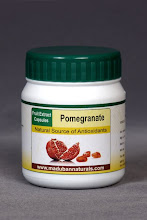A daily glass of Pomegranate juice is as potent as Viagra
Asian News International - Text
Last Updated: December 03, 2007 00:19:02
London, Nov 30 (ANI): Men who want to boost their performance in the bedroom should drink pomegranate juice, says a new research.
According to the University of California scientists, a daily glass can act like Viagra.
Lead author Dr Christopher Forest says that the juice is rich in antioxidants, which increases blood supply to the genitals.
For the study, the team tested 53 men with impotence problems.
They found that nearly half the men who drank it for a month said they found it easier to perform.
"Pomegranate juice has great potential," the Mirror quoted Dr Forest, as saying.
Pomegranates have already been associated with reducing the risk of heart disease and preventing prostate cancer.
Boffins had previously asserted that a daily 8oz glass of the fruit's juice not only increases the stability period of prostate cancer four-fold, but that the effect is so marked that they believe it can also make it possible for men between the ages of 60 to 75 to live out a full life span without the need for medical treatment, rather than dying from the cancer.
That study was conducted by researchers from the University of California who looked at 50 prostate cancer patients who had surgery or radiotherapy, who had experienced a post-treatment increase of PSA (prostate specific antigen), indicating that cancer was still present in their bodies.
During the study, the researchers measured the men's PSA levels to calculate how long they took to double.
They found that men suffering from prostate cancer with short doubling times are more likely to die from their illness, and that the average doubling time is 15 months.
They noted that consuming a glass of pomegranate juice everyday extended the doubling period to 54 months, and that there was also evidence that the juice was actually killing off prostate cancer cells.
Dr Allan Pantuck, who led the study, said that the improvements had been surprising, and that though it was not a cure, boffins may now be able to stump prostate cancer growth.
"I was surprised when I saw such an improvement. This is not a cure, but we may be able to change the way that prostate cancer grows," the Mirror quoted him, as saying. (ANI)
© Copyright 2007 Asian News International.
For Pomegranate based Health Supplements:
http://www.madubannaturals.com/
